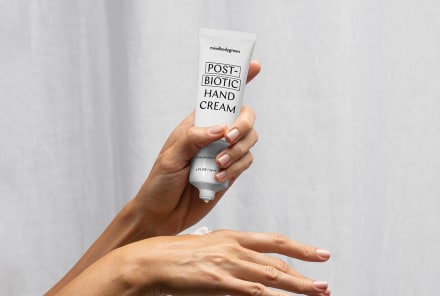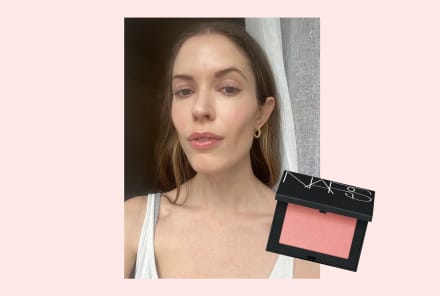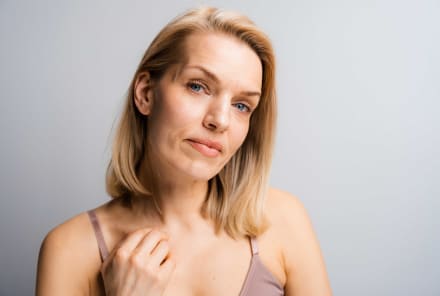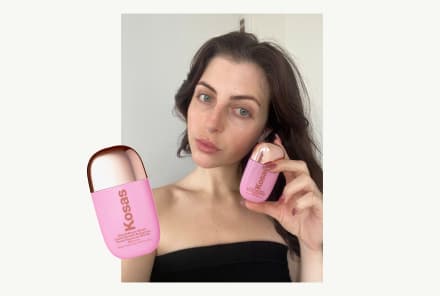Advertisement
This Documentary Is Convincing Thousands To Go Vegan — But Does It Tell The Whole Story? Here's What Doctors Say

It's the movie at the top of everyone's Netflix playlist right now: What the Health, the new documentary from the creators of the mega-popular Cowspiracy, is sparking emails and fervent dinner table discussions around the country. The film takes on big pharma, the meat and dairy industries, and the U.S. government.
Kimberly Snyder, the best-selling author and celebrity nutritionist featured in the film, explains, "What makes What the Health stand out from other food docs is how it brings to light the collusion between health organizations giving nutrition recommendations around particular diseases (breast cancer, diabetes, and so on), and big food/big pharma companies. The connection between big food business and our government has been out there—but not the health organizations, and that will be eye-opening to many."
Many experts agreed with the film's assertions encouraging consumers to question the money trail behind studies and government recommendations. This was demonstrated recently in the coconut oil controversy that took the internet by storm, which showed that even recommendations from government bodies like the American Heart Association still need to be approached with a hearty dose of skepticism and further research. "I completely agree with the film's assertion that a high animal-protein diet, especially devoid of plant foods, feeds a wide variety of health problems, and I also agree with the pervasive corruption of the mainstream food industry," says Dr. Will Cole, a functional medicine practitioner.
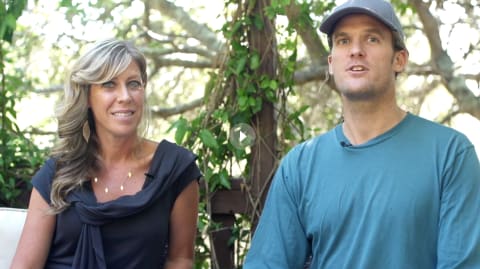
Is a Vegan Diet the Best Diet for Everyone?
The film makes a strong argument for veganism, stating that meat and dairy consumption is essentially a government-endorsed conspiracy contributing to rising rates of cancer, obesity, and heart disease.
"I was a vegan for 10 years, so I can definitely understand the film's perspective," says Dr. Cole. "Of course eating more plants is a great idea, of course avoiding all processed meats is fantastic advice, but eating healthy, grass-fed organic meats and fats can be a healthy part of a human diet. I see labs and lives improve from implementing these foods on an hourly basis. I have seen many patients, as well as myself, who ate a whole-foods-based vegan diet and over time it worsens their digestion, anemia, or fatigue. What's ultimately right for them? In today's convenient, pill-for-the-ill world they could supplement with iron, B12, and HCL, and they may get by. But will they thrive? The vegan diet is certainly phenomenally better than the standard Western diet. But just because something is better doesn't mean it's optimal."
Kimberly sees it differently. "True health is when you take in body, mind, spirit, community, the environment, and live a lifestyle that takes everything into consideration around you as well. When people talk about paleo or argue about eating meat, they aren't thinking about all of these other aspects of the bigger picture. I love the ayurvedic saying that says, 'As is the micro, as is the macro.' In other words, if something is truly good and healthy for us, it will also be truly good and healthy for the larger community and the environment, which is what eating a plant-based diet is all about."
"[What the Health] is having a positive impact, moving people to healthier diets emphasizing plant-based foods and away from processed foods. It's exploding based on the number of calls, texts, and messages I'm receiving," says Dr. Joel Kahn, a cardiologist who is featured in the film.
Jessica Cording, a registered dietitian, thinks the film asks too much of its viewers. "My feeling is that there's a lot of sensationalized finger-pointing out there but not enough support to actually help people make changes that improve their health—there is this idea that change has to be drastic and difficult in order to be meaningful, and I think this film perpetuates that notion," she says.
Eating One Egg Is Like Smoking Five Cigarettes

Perhaps the most heart-stopping (and certainly shareable) of the film's claims is the assertion that "eating one egg is as bad for life expectancy as smoking five cigarettes." The film argues that this is largely due to dioxins, highly toxic compounds that accumulate primarily in the fatty tissues of animals. Dioxins are scary stuff—the WHO calls them a "known carcinogen." So does that mean you should ditch your morning omelet?
Not so fast, according to some experts. "To say that dioxins accumulate specifically in eggs or other animal products is overly simplistic and incomplete. The dioxin factor is similar to the flawed argument that we should avoid organic animal products because of saturated fats and cholesterol. A diet rich in organic, pasture-raised eggs and other animal products has ample amounts of bioavailable true vitamin A, which is only found in animal products. Vitamin A down-regulates1 the toxic actions of dioxins. Research has found2 that, other than fish oil, which isn’t consumed in high amounts, rice was the most concentrated source of dioxin toxins. Animal foods such as eggs had dioxins, but on average, plant foods had higher amounts of dioxins compared to most animal products. For example, vegetables had almost six times2 the dioxin concentration of beef liver." While some of Dr. Cole's patients had elevated inflammation markers when consuming eggs, others didn't, pointing to a larger, more complex set of interactions at play.
Dr. Vincent Pedre, a gut health specialist, points out that studies about dioxins never take into account the quality of the meat. "I would like to see newer data and make a distinction between the type of meat source (grass-fed meats, free-range poultry, and wild-caught freshwater versus ocean fish)," he says. He notes that grass-fed meats tend to be far leaner and thus lower in dioxins, which gather in animal fat. "Are we going to recommend against breast milk because it has dioxin in it? No! We know the benefits of breastfeeding are wide-ranging; therefore, you have to balance the pros and cons of the information available to us when making choices about how to lead your life."
Speaking of Inflammation—Is It Caused by Sugar or Fat?

About halfway through the film, Dr. Garth Davis asserts that while sugar is low in valuable nutrients, it "does not cause inflammation" because it can be stored as glycogen. "The focus on sugar has taken the focus off meat, dairy, eggs, pork, turkey, chicken," he says.
Dr. Pedre vehemently disagrees. "Sugar is a major cause of inflammation and oxidative damage in the body. Excess sugar intake causes insulin resistance, leading to fat deposition in the abdomen, which then secretes a host of disease-causing inflammatory cytokines." Other research supports Dr. Pedre's opinion; almost every expert we spoke to agreed that sugar is a major problem in the standard American diet and should be consumed in absolute moderation.
So What's the Takeaway?
"I would encourage viewers to keep the big picture in mind and not spend excessive energy trying to delve into the minutiae of just one statement or another," says Kimberly.
"I agree that it's incredibly important for people to question where their food comes from and what's behind food marketing messages. That said, as a health care professional, I also have to wonder if shoving this information in people's faces without showing them how to apply that information in an approachable way is how to reach the people they're hoping to reach," says Jessica.
"There is no one-size-fits-all when it comes to diet. To be a healthy vegan, you need to know how to combine proteins to make sure you're getting the full range of amino acids the body needs. And even when doing that, there is no protein more efficient for the body to utilize than animal protein," says Dr. Pedre. "When it comes to animal protein, you cannot generalize without talking about the specifics of how the meat has been raised and what food the animals ate. It is true to believe that factory-produced animal products contain a variety of harmful ingredients, from growth hormones to antibiotics to elevated levels of fat from an unnatural grain-based diet. It is true that dioxins are among the most toxic substances. They are often found in farm-raised fish. The key when eating meat is to not eat too much. But when you eat it, eat meat that comes from sources that raise the animals with their historical diet under low-stress circumstances. Free-range, grass-fed, and wild-caught are best. Remember: 'You are what what you ate has eaten.'"
What the Health is telling an important story—and highlighting just how much disagreement there is in the health food world (which is, in the current climate, hard not to see as reflective of the world at large). It's easy to cherry-pick studies to shape an argument in many directions, which is why so many experts recommend a personalized approach to nutrition based on what works with your individual body.
"If you’re waiting around for science to tell you exactly how to eat, you’ll starve to death first. Nutrition science is confusing. You can find “science” to back up just about any assertion. Heck, even Harvard and Oxford argue about the research! If THOSE smartypants can’t agree, how are normal people like us expected to make sense of it all? Self-experimentation, that’s how," says Melissa Hartwig, founder of the Whole30. "And that’s how you’ll know if following the What the Health recommendations might work just as well (or even better) for you than your current dietary plan. If you’re really that curious, that questioning, that committed to your own health and happiness, commit to a plant-based diet experiment. Give it thirty days in a row. Do it 100% by the books—go FULL vegan, no cheat, no slips, no special occasions. Read every label. Research how to do it healthfully. And when you’re done, compare your experiences."
At the end of the day Dr. Cole wonder why the "the wellness world can't focus on the many things we have in common instead of that which divides us?" What's true for one person may not be true for another, but it is true that the more we seek out the whole story instead of simply that which confirms our pre-existing opinions, the better off we'll all be.
Watch Next
Enjoy some of our favorite clips from classes
Enjoy some of our favorite clips from classes
What Is Meditation?
Mindfulness/Spirituality | Light Watkins
Box Breathing
Mindfulness/Spirituality | Gwen Dittmar
What Breathwork Can Address
Mindfulness/Spirituality | Gwen Dittmar
The 8 Limbs of Yoga - What is Asana?
Yoga | Caley Alyssa
Two Standing Postures to Open Up Tight Hips
Yoga | Caley Alyssa
How Plants Can Optimize Athletic Performance
Nutrition | Rich Roll
What to Eat Before a Workout
Nutrition | Rich Roll
How Ayurveda Helps Us Navigate Modern Life
Nutrition | Sahara Rose
Messages About Love & Relationships
Love & Relationships | Esther Perel
Love Languages
Love & Relationships | Esther Perel
